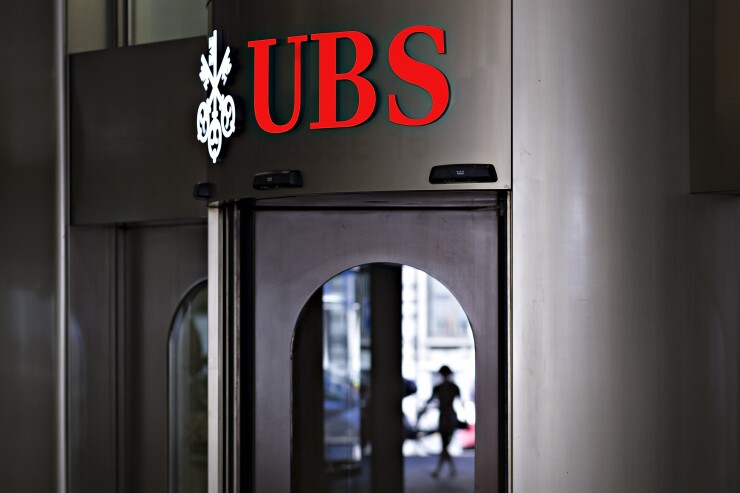UBS is making a course correction, replacing non-solicitation language that was recently introduced into some advisors' bonus agreements with new policies intended to mollify broker concerns, according to two people familiar with the matter.
The firm, which notified advisors Friday via a memo from President Tom Naratil and Head of Wealth Management USA Brian Hull, is making the adjustments in response to reactions to policy changes made this month.
Brokers were taken by surprise when UBS recently strengthened non-solicit language in bonus agreements that required advisors who signed them to agree to a 12-month non-solicitation period should they leave UBS.

"This announcement was so unlike the firm," says a UBS manager who asked not to be named in order to discuss the matter.
The policy shift wasn't consistent with how the firm handles such changes and left advisors confused, he said. In a conference call with brokers on Wednesday, Naratil and Hull apologized and explained what the normal procedure is, the manager says. Several committees comprised of executives and advisors would review such a change.
"It didn't go through the normal vetting process. They all normally look at this," he says.
For bonus agreements to be signed by mid-April, UBS will revert to the previous standard, which required a 12-month non-solicitation period only if departing advisors did not pay back debts owed to UBS.
The firm is also notifying advisors what the language will be in agreements to be signed in 2019 for bonuses earned this year. UBS will introduce a contract that lasts for 12 months; if an advisor who signed the agreement leaves during that period, then he or she will be subject to a 12-month non-solicitation period. Leave after the contract expires, and no non-solicitation applies.
However, the firm is also making concessions it hopes it will reassure brokers of its commitment to its current operating model, the people said.
-
If you plan to join another firm or go indie, you’d better reacquaint yourself with this landmark agreement first.
November 3 -
During the transition in independence, avoid running afoul of legal breaches and other quicksand that can drag you down.
February 25 -
Recruiter Mindy Diamond says the historic accord forged a bond of trust between advisors and their firms that the industry cannot afford to lose.
November 5
For instance, should UBS make material changes to its broker compensation grid ― eliminating it entirely or reducing the grid rate and length of service award in the aggregate by 500 basis points or more ― then the non-solicitation period would not apply.
The move, according to the sources, is intended to reassure brokers that UBS is not attempting to handcuff them with a non-solicit and then make substantial changes to their pay.
"Had they kept that policy in place, they were destroying the franchise," says recruiter Danny Sarch.
He adds that it would have added to their credibility to have done it earlier in the week, but the move could allay some brokers' concerns. "The question [now] is whether they regained trust."
It's also critical to note that the policy change only affected bonus agreements, says Jim Eccleston, an attorney at Eccleston Law.
"I've negotiated and helped remove language that was more restrictive than this," he says.
The now-overturned-policy required advisors who signed the agreements not to solicit clients for 12 months after leaving the firm, according to documents seen by On Wall Street.
The policy required brokers to refrain from directly or indirectly initiating, "any contact or communication of any kind whatsoever" for the purpose of getting a client to transfer accounts away from UBS to the broker's new firm. It wasn't clear from the language whether that would include social media.
Among recent career changes, Merrill Lynch lost brokers managing $2.2 billion to rival J.P. Morgan Securities.
This replaced a previous non-solicitation policy that only applied if advisors failed to back any debts owed to UBS, which had more than 6,800 advisors at the end of 2017.
The adoption and subsequent amendment of the new policy shows how firms are finding their footing in a post-Broker Protocol landscape.
"The marketplace for transitions is so competitive that firms was to A) remain competitive and B) appear to be treating their reps fairly," Eccleston says.
In recent months, UBS, Morgan Stanley and Citigroup
Since leaving the protocol, Morgan Stanley
Their departures sparked speculation as to whether other large brokerages would follow suit. But several firms, such as Merrill Lynch and Raymond James, have affirmed their commitment to stay in the protocol, saying it benefits advisors as well as clients.






